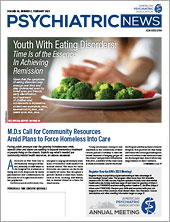Bipartisan congressional legislation was introduced last October by Reps. Paul Tonko (D-N.Y.) and Brian Fitzpatrick (R-Pa.) to address the current and future epidemic of mental and behavioral health problems. HR 9201, the Community Mental Wellness and Resilience Act, contains essential policies to support and fund community-based initiatives using public health approaches to create population-level mental wellness and resilience for all types of adversities, including those generated by the climate emergency. Last December Sens. Ed Markey (D-Mass.), Jeff Merkley (D-Ore.), and Richard Blumenthal (D-Conn.) introduced a companion bill, S 5251, in the Senate.
The need for the new policy is abundantly evident. In 2021 alone, more than 1 in 5 American adults was diagnosed with a mental illness. Social determinants are causative factors in many cases, derived from cumulative and accelerating toxic stresses due to job, income, housing, poverty, and other struggles, as well as the enormous number of people and families impacted by extreme weather and other natural disasters. Disasters traumatize between 20% and 40% of those who are directly impacted, as well as those who know someone who is affected or observe the events from afar. This combination of escalating toxic stresses and acute disasters produces individual, community-level, and societal traumas.
The mental health, social, and disaster response and service systems in the United States cannot assist all who experience mental and behavioral health problems today. This gap will only grow as the climate emergency worsens. In addition, many people will not engage in treatment due to lack of insurance, high costs, fears of being stigmatized, and other reasons. Community-based initiatives that help all adults and youth strengthen their capacity for mental wellness and resilience will go a long way in addressing these issues.
When HR 9201 was introduced, APA CEO and Medical Director Saul Levin, M.D., M.P.A., issued this statement: “The American Psychiatric Association strongly supports the Community Mental Wellness and Resilience Act and commends Reps. Paul Tonko and Brian Fitzpatrick for their leadership in introducing it. This forward-thinking proposal would authorize grants focused on strategies to enhance the ability of communities to confront the mental health impacts of acute and long-term disruptions from natural disasters, as well as other public health impacts of climate change. APA strongly supports this effort to foster resilience and mental wellness in communities across the nation.”
In addition to APA, over 120 national, state, and local organizations have endorsed HR 9201. They include the American Psychological Association, National Association of Social Workers, American Public Health Association, Mental Health America, National Association of State Mental Health Program Directors, Children’s Environmental Health Network, National Council for Mental Wellbeing, Alliance of Nurses for Healthy Environments, Health Care Without Harm, and many others. State organizations and numerous local organizations also endorsed the legislation. State organizations and numerous local organizations also endorsed the legislation.
Specifically, the Community Mental Wellness and Resilience legislation would do the following:
•
Authorize the Centers for Disease Control and Prevention (CDC) to establish a grant program to expand existing community-based initiatives and form new ones that use a public health approach to enhance population-level capacity to prevent and address mental health problems generated by persistent disasters and toxic stresses.
•
Appropriate $30 million for fiscal years 2023 through 2027 to fund small planning grants of up to $15,000 to support the organization of community initiatives and larger program grants of up to $4 million to support and help expand existing community wellness and resilience initiatives.
•
Fund community-based initiatives that involve a wide and diverse network of grassroots and neighborhood leaders and nonprofit, private, and public organizations.
•
Develop age and culturally appropriate community strategies to engage all adults and youth in enhancing and sustaining mental wellness and resilience, with high-risk individuals and those with symptoms of pathology given special attention as part of the larger community effort.
•
Use strategies that are evidence based, evidence informed, promising, and/or Indigenous practices to engage residents in strengthening existing protective factors and form additional ones to help all adults and youth push back against traumatic stressors, maintain mental wellness, and rapidly recover when they are impacted by toxic stresses or disasters. Fund individualized mental health treatment to support the community-based wellness and resilience building activities and assist people who still cannot function or are at risk of harming themselves or others.
Reps. Tonko and Fitzpatrick and Sens. Markey, Merkley, and Blumenthal, along with a growing number of co-sponsors, will reintroduce the Community Mental Wellness and Resilience Act in the new Congress (likely with some slight adjustments). APA members are encouraged to contact their House and Senate members and urge them to co-sponsor the legislation and push for rapid enactment. ■

